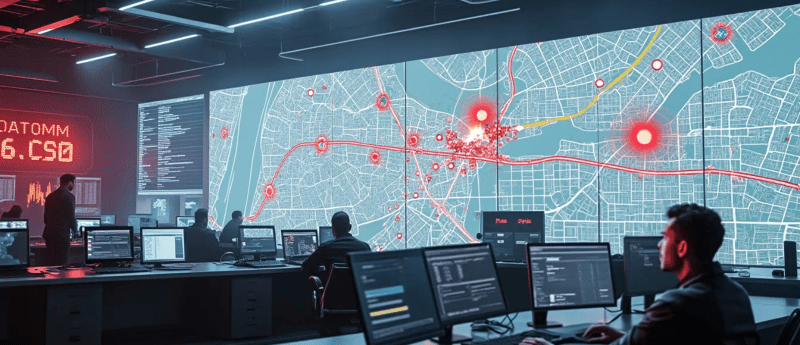Israel Develops AI Tool that Predicts and Prevents Medical Emergencies

Members of the Israeli military’s elite intelligence unit 8200, alongside United Hatzalah’s Operations and Technology Department, have developed an AI tool designed to predict and prevent medical emergencies across Israel. The system, which is fully operational nationwide, anticipates where the next emergencies are likely to occur. This enables timely and proactive responses, potentially preventing medical crisis and saving lives.
Why Was the AI System Developed?
Emergency medicine is under increasing strain, with longer emergency department wait times, reliance on high-acuity diagnostic decisions, and healthcare providers constantly pushed to the limits of their cognitive bandwidth.
The situation is critical in Israel, where the ongoing armed conflict is straining the country’s medical services.
In this context, on October 7th, over a thousand members of United Hatzalah’s all-volunteer network of trained emergency responders were drafted into the Israel Defense Forces, causing a significant gap in response capacity. Thus, United Hatzalah recognized the need for a solution to strengthen its response and achieve the goal of reaching emergencies within 90 seconds.
Therefore, the team developed a tool designed to predict the locations of upcoming emergency calls. The goal was to pre-position ambulances and “ambucycles” in the right areas, ensuring a faster and more efficient emergency response.
How Does the System Work?
To develop and train the AI tool, developers utilized a comprehensive dataset spanning 18 years of historical emergency data.
This wealth of information enables the AI technology to create highly accurate, city-specific predictive models that evaluate various risk factors, including weather conditions, geographic features, and the time of day. Using these models, the system dynamically reallocates emergency responders to areas identified as high-risk, displaying potential emergency locations on a map to ensure rapid and targeted deployment.
The AI breaks down the alerts into specific time segments, making predictions for the upcoming 10 minutes. These predictions adjust dynamically throughout the day, evolving as the hours pass and conditions change.
Shift workers can use their phones to see where the AI anticipates a call might occur.
Now fully operational for United Hatzalah’s 8,000 volunteers, the model transitions emergency response from reactive to proactive, using data to anticipate and prevent emergencies before they happen.
Promising Potential
During a three-month pilot program, the tool was able to predict, with 85% certainty, the location of the next emergency call in major Israeli cities within a 1–2-minute distance radius.
According to Dovie Maisel, VP of Operations at United Hatzalah, this system is revolutionizing how volunteers work.
“It’s tremendous. When a volunteer goes out for a shift, they don’t have to waste all their shift driving and going back and forth across town. They go to the marks on the map and within a minute or two, they get a call which is literally half a block away. They’re saving more lives, they’re getting to more people in need during their shift and all in all, it’s a win-win across the board.”
Dovie Maisel, VP of Operations at United Hatzalah
Maisel also shared a real-life example of the tool’s efficiency: the dispatcher sent him to a mall in Rishon Lezion, based on the AI’s prediction of a potential emergency. Before even reaching the mall, his app alerted him to a patient with chest pains just 400 meters away. Remarkably, Maisel arrived before the caller even hung up, highlighting the tool’s ability to drastically reduce response times and enhance emergency care.
This is not the first time United Hatzalah has introduced innovative solutions to meet medical needs with global impact. In 2006, the organization pioneered location-based activation for volunteers—an early version of what we now know as services like Uber.
Saving Lives by Reducing Response Times
In emergency medicine, every second counts. Having services pre-positioned in areas with the highest likelihood of emergencies ensures medical teams can arrive faster, deliver timely care, and improve patient outcomes.
Additionally, this proactive approach is not only beneficial in urban areas, where traffic can cause delays, but it could also be a game-changer in rural or underserved regions, where response times tend to be slower.
Ultimately, faster response times mean more lives saved and better long-term health outcomes.
This is not the first time AI devices have shown promise in enhancing medicine. These tools have already demonstrated their potential in areas including drug discovery and development and medical imaging. Additionally, a recent study showed that AI could also assist in generating efficient emergency medicine handoff notes, highlighting the promise of using AI in this high-pressure environment.
What’s Next?
Looking to the future, the United Hatzalah tool has the potential to reshape modern emergency systems, optimizing resource allocation, reducing response times and ultimately saving more lives. This proactive approach could pave the way for more efficient and effective emergency medical services globally, setting a new standard for the future of Emergency Medical Services.
However, it’s important to recognize that AI is not flawless. Approximately 15% of the time, the United Hatzalah’s AI flagged incorrect locations, leading to services being dispatched to areas where no emergency would take place. This could strain resources in areas where no crisis is occurring, leaving fewer responders available to reach the locations where emergencies are happening.
Moreover, since the system’s alerts are based on probabilities derived from existing data, the tool cannot identify the specific type of emergency. Thus, looking ahead, future improvements could focus on expanding the tool’s capabilities to detect the nature of emergencies, allowing for faster, more tailored responses to different scenarios.
